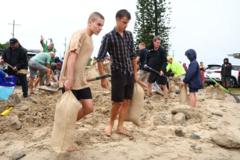Australia's eastern coastline is bracing for the impact of Tropical Storm Alfred, which is set to make landfall on Saturday morning, having already led to the evacuation of tens of thousands of residents and causing power outages for over 230,000 households. Originally classified as a cyclone, the system has since been downgraded to a tropical low, with wind speeds forecasted to reach a maximum of 85km/h, less intense than initially expected.
Watched closely by the Bureau of Meteorology, the storm is currently stationed off Bribie Island, moving slowly northward toward the coast between the island and Maroochydore. Despite the downgraded status, authorities are issuing warnings for residents to stay indoors, particularly concerning hazardous beach conditions, with heavy rain and flash flooding anticipated in the region.
Senior meteorologist Miriam Bradbury informed ABC News Breakfast that the system poses ongoing risks of severe weather, particularly rainfall. "Rainfall totals could easily exceed 200mm or more," she cautioned, warning of the potential for flash flood events as the storm continues to rage on.
The storm's sluggish movement has led weather experts to describe its pace as "walking speed," which raises concerns over flooding in low-lying areas, especially in Queensland and northern New South Wales, where around four million people are located within the storm's projected path. With reports of a man missing after his vehicle was swept into a river and widespread flash floods already reported, the situation is precarious.
Residents like Stephen Valentine in Logan City, south of Brisbane, have taken extensive precautions. "We prepared about 30 litres of water and food supplies for pets, and secured rooms away from windows," he shared. Despite the anxiety surrounding the storm, Prime Minister Anthony Albanese reassured the public of their resilience, stating, "These are tough times, but Australians are tough people."
Cyclone Alfred marks a significant threat to the area, historically not accustomed to cyclones this far south, with the last notable cyclone being way back in 1974. Businesses, schools, and public transport have halted, airports are closed, and elective surgeries are cancelled as communities brace for heavy rainfall that could reach as much as 800mm in the following days.
Residents have positioned sandbags and taken safety measures, yet some surfers are still out braving the storm, looking to catch the waves stirred by the tempest. "This is what we look forward to," said one avid surfer, though his comments reflect the contrasting sentiments in a community that is grappling with the challenges of a powerful storm.
As the storm approaches, Prime Minister Albanese stressed the importance of adhering to safety warnings, urging people not to be reckless or attempt to experience the severe weather first-hand. "This isn't a time for sightseeing or for trying to see what it's like," he remarked, imploring the public to prioritize safety over curiosity.


















